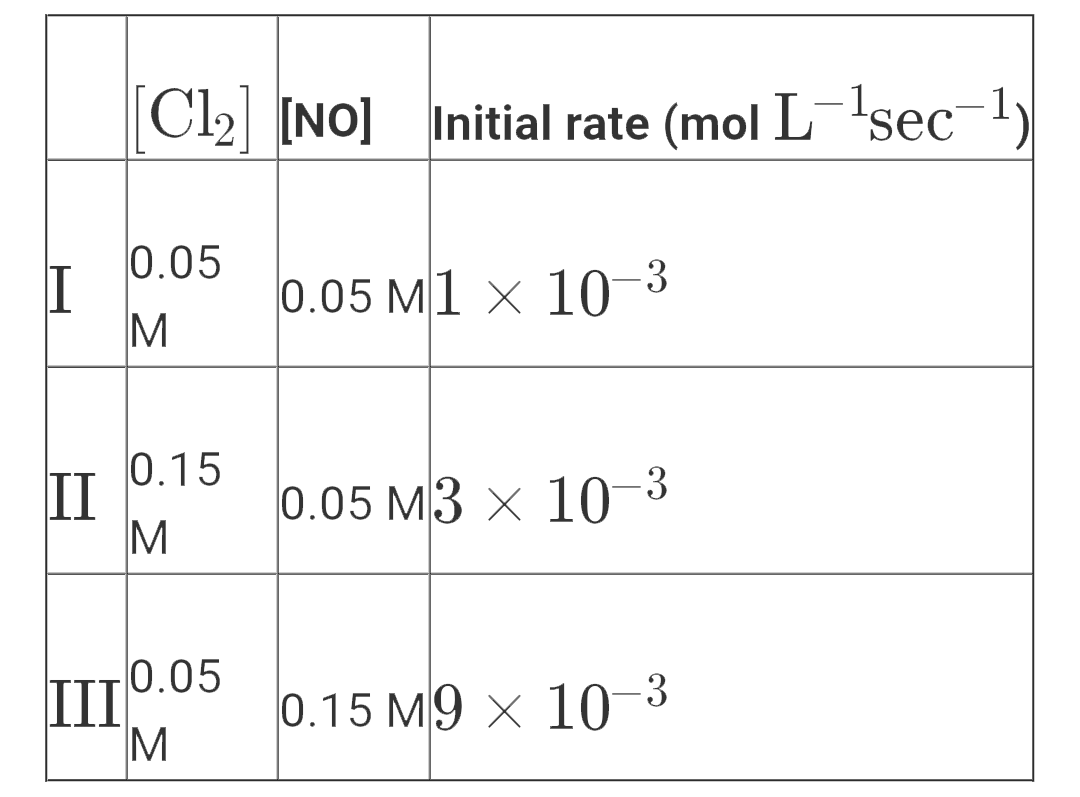Calculate the free energy change at 298 K for the reaction,
Br2(l)+Cl2(g)→2BrCl(g). For the reaction ΔH∘=29.3 KJ & the entropies of Br2(l),Cl2(g) & BrCl(g) at the 298 K are 152.3,223.0,239.7 J mol−1K−1 respectively.
−1721.8 J
−60321.8 J
+60321.8 J
+1721.8 J
The correct Answer is:A
To calculate the free energy change (ΔG) at 298 K for the reaction:
Br2(l)+Cl2(g)→2BrCl(g)
we will follow these steps:
Step 1: Convert ΔH from kJ to J
Given:
ΔH∘=29.3kJ
To convert this to joules:
ΔH∘=29.3kJ×1000J/kJ=29300J
Step 2: Calculate the entropy change (ΔS)
The entropies of the substances at 298 K are given as:
- S(Br2(l))=152.3J/mol⋅K
- S(Cl2(g))=223.0J/mol⋅K
- S(BrCl(g))=239.7J/mol⋅K
The entropy change (ΔS) for the reaction can be calculated using the formula:
ΔS=Sproducts−Sreactants
Calculating ΔS:
Sproducts=2×S(BrCl)=2×239.7J/mol⋅K=479.4J/mol⋅K
Sreactants=S(Br2)+S(Cl2)=152.3J/mol⋅K+223.0J/mol⋅K=375.3J/mol⋅K
Now, substituting the values:
ΔS=479.4J/mol⋅K−375.3J/mol⋅K=104.1J/mol⋅K
Step 3: Calculate ΔG using the Gibbs free energy equation
The Gibbs free energy change (ΔG) is calculated using the formula:
ΔG∘=ΔH∘−TΔS
Substituting the values:
- ΔH∘=29300J
- T=298K
- ΔS=104.1J/mol⋅K
Calculating:
ΔG∘=29300J−(298K×104.1J/mol⋅K)
Calculating TΔS:
TΔS=298×104.1=31025.8J
Now substituting back:
ΔG∘=29300J−31025.8J
ΔG∘=−1725.8J
Final Result
Thus, the free energy change at 298 K for the reaction is:
ΔG∘≈−1721.8J
Given:
ΔH∘=29.3kJ
ΔH∘=29.3kJ×1000J/kJ=29300J
The entropies of the substances at 298 K are given as:
- S(Br2(l))=152.3J/mol⋅K
- S(Cl2(g))=223.0J/mol⋅K
- S(BrCl(g))=239.7J/mol⋅K
ΔS=Sproducts−Sreactants
Sproducts=2×S(BrCl)=2×239.7J/mol⋅K=479.4J/mol⋅K
ΔS=479.4J/mol⋅K−375.3J/mol⋅K=104.1J/mol⋅K
The Gibbs free energy change (ΔG) is calculated using the formula:
ΔG∘=ΔH∘−TΔS
- ΔH∘=29300J
- T=298K
- ΔS=104.1J/mol⋅K
ΔG∘=29300J−(298K×104.1J/mol⋅K)
TΔS=298×104.1=31025.8J
ΔG∘=29300J−31025.8J
ΔG∘=−1725.8J
Thus, the free energy change at 298 K for the reaction is:
ΔG∘≈−1721.8J
Topper's Solved these Questions
- THERMODYNAMICSBOOK - VMC MODULES ENGLISHCHAPTER - THERMODYNAMICSEXERCISE - LEVEL-2
50 Videos
- THERMODYNAMICSBOOK - VMC MODULES ENGLISHCHAPTER - THERMODYNAMICSEXERCISE - LEVEL-2 (NUMERICAL VALUE TYPE)
15 Videos
- THERMODYNAMICSBOOK - VMC MODULES ENGLISHCHAPTER - THERMODYNAMICSEXERCISE - LEVEL-0 (LONG ANSWER TYPE (5 MARKS))
6 Videos
- THERMOCHEMISTRYBOOK - VMC MODULES ENGLISHCHAPTER - THERMOCHEMISTRYEXERCISE - JEE ADVANCED (ARCHIVE)
31 Videos
- THERMODYNAMICS & THERMOCHEMISTRYBOOK - VMC MODULES ENGLISHCHAPTER - THERMODYNAMICS & THERMOCHEMISTRYEXERCISE - Impeccable
48 Videos
Similar Questions
Calculate the entropy change at 298K for the reaction
Br2(l)+CI2(g)→2BrCI(g)
ΔH=29.3kJat298K. The entropies of Br2(l),CI2(g), and BrCI(g) at the above temperature and 152.3,223.0 and 239.7Jmol−1K−1 respectively.
View SolutionThe given data are for the reaction, 2NO(g)+Cl(g)→2NOCl(g) at 298K

The rate law of the reactions is
View Solution
Knowledge Check
What will be the standard internal energy change for the reaction at 298 K ?
OF2(g)+H2O(g)→2HF(g)+O2(g),ΔH∘=−310kJA(a) −312.5kJB(b) −125.03kJC(c) −310kJD(d) −156kJFor the reaction, CO(g)+Cl2(g)⇔CoCl2(g), the value of Kp/Kc is equal to
A1BRTC√RTD1RT
The enthalpy change (ΔH) for the reaction, N2(g)+3H2(g)→2NH3g is −92.38kJ at 298K What is ΔU at 298K?
View SolutionThe enthalpy change (ΔH) for the reaction
N2(g)+3H2(g)→2NH3(g)
is −92.38kJ at 298K. What is ΔU at 298K?
View SolutionCalculate the standard enegry change for the reaction:
OF2(g)+H2O(g)→O2(g)+2HF(g)at298K
The standard enthalpies of formation of OF2(g),H2O(g), and HF(g) are +20,−250, and −270kJmol−1, respectively.
View SolutionCalculate the entropy of Br2(g) in the reaction H2(g)+Br2(g)→2HBr(g),ΔS∘=20.1JK−1 given, entropy of H2 and HBr is 130.6 and 198.5 J mol−1K−1 :-
View SolutionIt is possible to calculate the value of ΔH for the reaction
H2(g)+Br2(l)→2HBr(g) from the bond enthalpy data alone.
View SolutionThe net enthalpy change of a reaction is the amount of energy required to break all the bonds in reactant molecules minus amount of energy required to form all the bonds in the product molecules. What will be the enthalpy change for the following reaction ? H2(g)+Br2(g)→2HBr(g). Given that, bond energy of H2,Br2 and HBr is 435kJmol−1,192kJmol−1 and 368kJmol−1 respectively
View Solution
